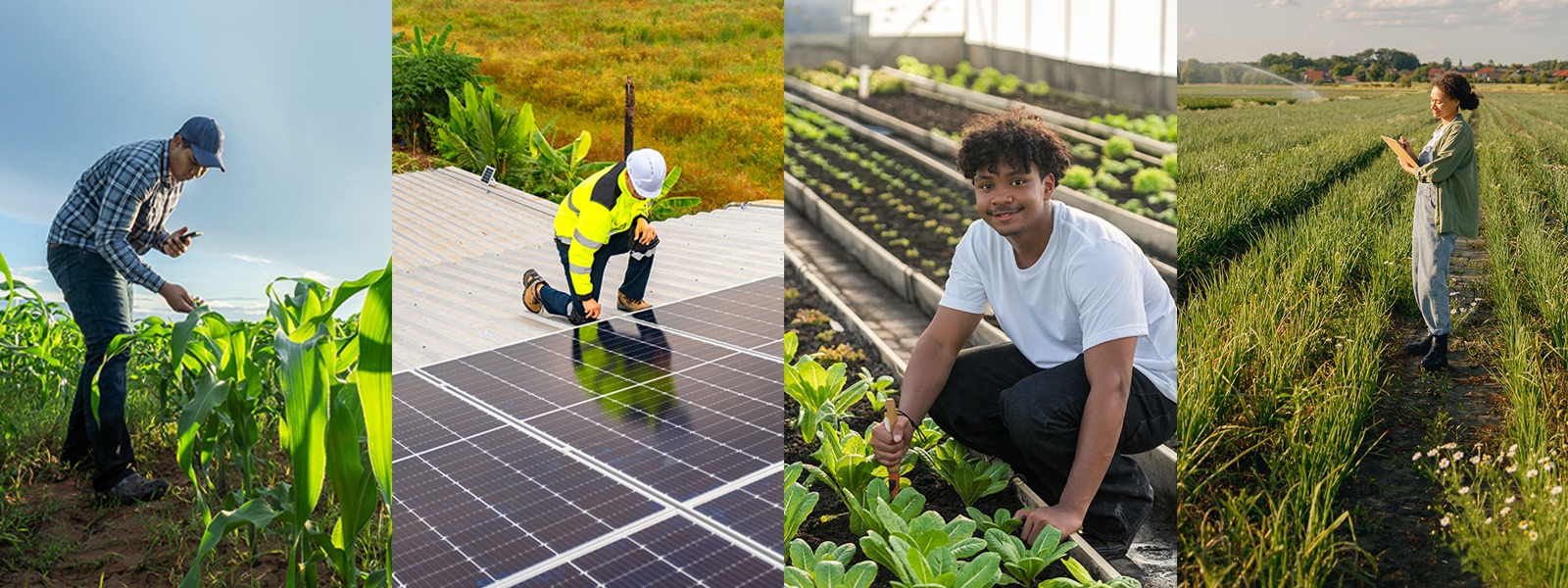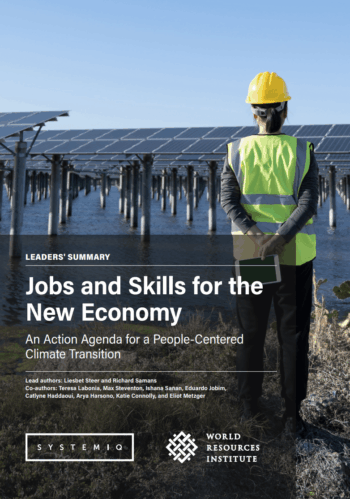Landmark global report and initiative launches at COP30 putting people at the heart of the climate transition.
A major new report and global initiative, Jobs and Skills for the New Economy, is launching today at COP30. Designed for decision-makers in government, business and civil society, the initiative sets out a comprehensive Action Agenda for ensuring that people – their jobs, skills and livelihoods – are central to the transition to a low-carbon, resilient economy.
The Initiative builds on new global research from Systemiq and World Resources Institute (WRI) which shows that the climate transition could create an estimated 375 million new jobs over the next decade, particularly in renewable energy, construction and nature-based solutions – representing a 20% increase in employment within those industries. Adaptation activities, such as building resilient infrastructure, are expected to be a major source of employment as well, generating an estimated 280 million jobs worldwide.
The report, produced by Systemiq, presents an integrated framework linking climate action, skills development, and economic transformation, with a clear message: the transition to a sustainable economy will succeed only if powered by skilled, secure, and supported workers.
A changing world of work
The emerging economy is being profoundly reshaped by climate change, technological disruption, demographic shifts, and geopolitics. Together, these forces are transforming the jobs and skills people need to thrive. Countries and industries that place human capital, the skills, knowledge, and resilience of their people, at the heart of transition strategies stand to gain a powerful economic, social and environmental advantage.
Yet, to date, investment in people has too often been reactive or overlooked. Less than half of countries’ Nationally Determined Contributions (NDCs) even mention skills or workforce strategies, and only 1% include dedicated financing for them. This gap threatens to slow progress, widen inequality and erode trust in the climate transition.
The Jobs and Skills for the New Economy report offers a different vision – one where people are not passive recipients of change, but active drivers of innovation and economic transformation.
Working with the COP30 Presidency, the World Resources Institute, and a wide coalition of international partners, Systemiq contributed to building the economic evidence base and designing the Action Agenda that now guides the initiative. This effort brings together the diverse disciplines that must collaborate to make a just and effective transition possible, from climate science to business strategy, education and social policy. By helping to connect governments, industry leaders, labour organisations and civil society, the initiative seeks to align climate ambition with social progress.
The report’s Action Agenda provides a roadmap across three key pillars:
- Intentionality: Embed jobs and skills strategies into national climate and industrial plans, backed by workforce intelligence and local transition pacts.
- Innovation: Build agile, modular, and inclusive training systems, alongside industry-led consortia to align skills with emerging green sectors.
- Investment: Treat spending on human capital as investment, mobilising public and private finance, and creating incentives for business and households to invest in skills.
This framework outlines the decisive measures needed to ensure the climate transition becomes an engine of opportunity, not division.
A global effort for impact
The Global Initiative on Jobs and Skills for the New Economy, launched alongside the report, will coordinate action across governments, industries, and international institutions to implement this agenda. It will operate through four impact tracks:
- Knowledge and learning – building the global evidence base through research, data and peer learning.
- Country Action Partnerships – supporting national governments to design and implement jobs and skills strategies.
- Industry Action Partnerships – enabling corporate and sectoral leadership to scale workforce innovation.
- Building the movement – uniting leaders around a shared vision for a people-centered transition.
Early engagement is already underway with countries including Brazil, Cambodia, Egypt, India, Indonesia, Kenya, Pakistan, the Philippines, and South Africa, alongside partnerships with leading development institutions and private-sector coalitions.
The launch of the report and initiative marks a pivotal moment for global climate action – one that recognises people as the true engines of change. Investing in jobs and skills will not only accelerate climate goals but also drive innovation, resilience and social inclusion.
As the world moves toward implementation beyond COP30, the Initiative offers a practical pathway to ensure that the new economy delivers for everyone: creating good jobs, building skills for the future, and making the climate transition fair, fast, and lasting.


